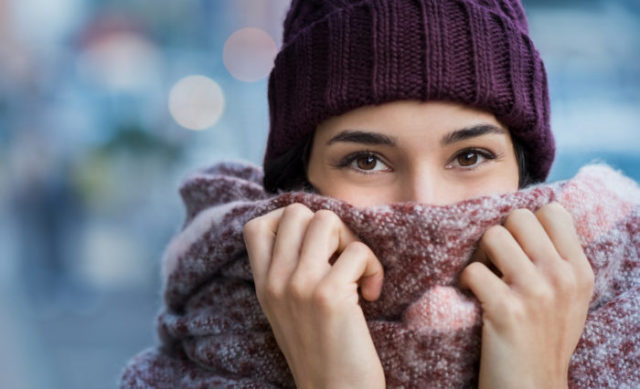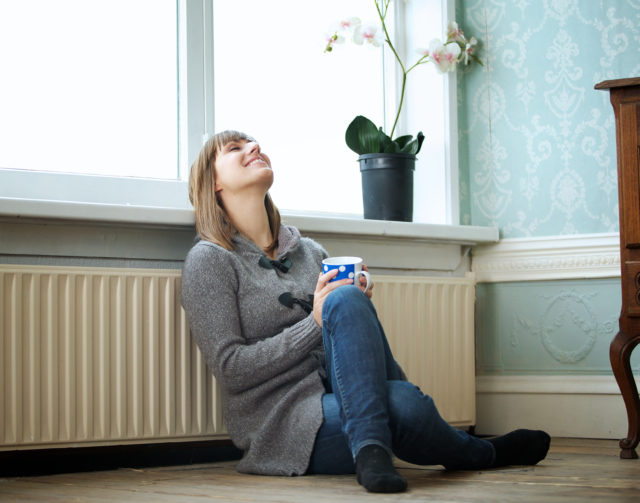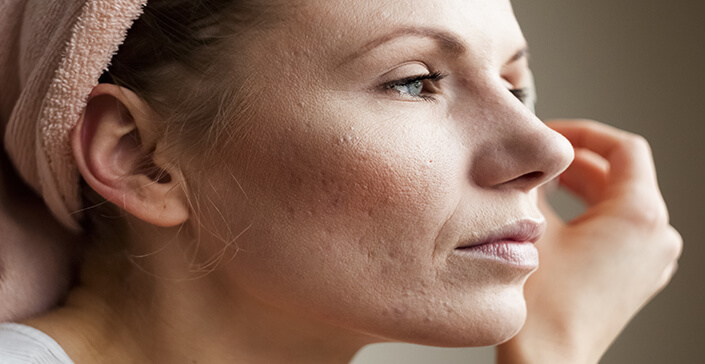So, we've rounded up some of our favourite tips and products to help you beat the discomfort and how to calm rosacea flare-up during the chilly weather and keep your rosacea symptoms at bay:
#1 Avoid long, hot showers

So hard to do in the winter months, but necessary if you want to combat face flushing. Hot water strips the skin from its natural oils and moisture, so after a day of braving the cold, the last thing you want to do to your sensitive face is put it under a steaming hot shower.
#2 Cover up

Limit your cold exposure as much as you can. Infinity scarves are not only a good fashion choice, but you can pull them up and protect your face from the biting wind. When you suffer from rosacea, you always want to avoid dramatic changes in your body temperature. Try to layer your outfit, so you can quickly peel off when you start to feel too warm, after coming into a heated building from frosty outdoors.
#3 Turn the thermostat down

With freezing temperatures outside, it’s tempting to turn up the heating and snuggle up, when you get home. However, dry warm air doesn’t do your irritable skin any good. Instead of cranking up the heat, put on the humidifier. If you don’t have a central one, you can buy a portable humidifier or just put a bowl of water next to your radiators. It will put the much-needed moisture back in the air.
Revamp your rosacea skincare routine for winter
Choosing the right products for your winter routine is the most important part of your flare-up management. Any abrasive products can further irritate your already sensitive skin, so forget about scrubs, cleansing powders, and aggressive exfoliators. A good rosacea routine should consist of the following steps:• Protection
It might be tempting to skip sunscreen when the thermometer dips down below freezing, but just because you don’t feel the sun as much as you do in the summer, it doesn’t mean the UV rays are not damaging your skin. Oclipse-C™ is a non-irritating, mineral SPF 50 sunscreen, developed to protect the most sensitive skin types. It shields your skin from UVA, UVB, HEV and IR-A rays and supports its natural barrier function thanks to a slow-release antioxidant complex. Use daily to prevent your cheeks from turning red this winter.
Oclipse-C™ is a non-irritating, mineral SPF 50 sunscreen, developed to protect the most sensitive skin types. It shields your skin from UVA, UVB, HEV and IR-A rays and supports its natural barrier function thanks to a slow-release antioxidant complex. Use daily to prevent your cheeks from turning red this winter.• Cleansing
If your skin is rosacea-prone, you need to be extra careful when choosing your cleansing products. Even the ones labelled for “sensitive” skin can cause irritation.
Rozatrol™ is an enzymatic exfoliator which provides ultra-mild cleanse and prevents excess sebum production. This little tube can be a lifesaver for anyone struggling with rosacea flare-ups. It not only cleans your skin thoroughly but also reliefs existing redness and inflammation thanks to its amino acid complex.
• Hydration
The last step in your winter routine is the most obvious one…Hydration. At this time of the year, you want to give your skin a major hydration boost and lock in as much moisture as you can.
For a quick flare-up relief, use the Restoracalm™ soothing recovery cream. It provides immediate comfort to dry, flushed skin and stimulates the natural restoration of the skin barrier. Restoracalm™ has been developed with silk sericin protein to support skin’s recovery process and prevent future irritation and signs of ageing.
 By Yoana
By Yoana